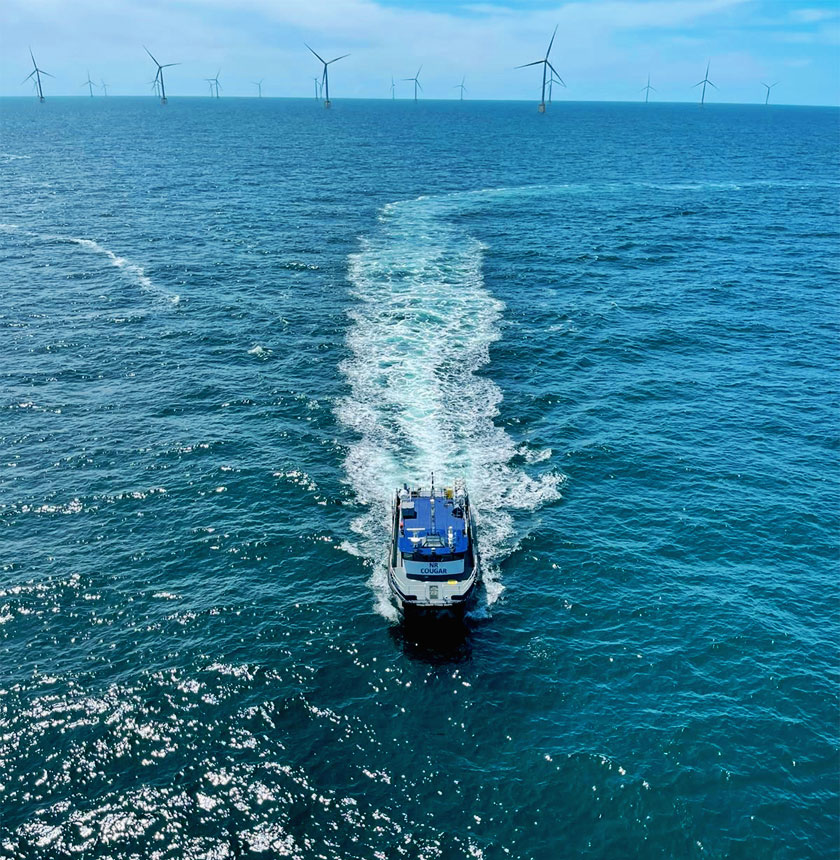Biofuel Gains Traction in UK Offshore Wind Service Sector

A second-generation biofuel derived from waste vegetable oil is gaining traction in the UK's offshore wind industry, which - despite its solid green credentials - must still rely on diesel-powered crew transfer vessels (CTVs) and other workboats for its operations.
Hydrotreated vegetable oil (HVO) offers the drop-in replacement convenience of conventional biodiesel, but without the engine compatibility issues, bacterial degradation and water contamination often encountered with high-percentage blends of fatty-acid methyl ester (FAME) fuel. It is manufacturer-approved by several diesel builders, like Volvo Penta, which has given HVO the green light for use in its engines at blend ratios of up to 100 percent.
Since it is a simple and cost-effective way to achieve carbon emissions reductions, HVO is taking hold in the UK offshore wind service sector. Seacat Services has adopted a 30 percent HVO / diesel blend (HVO30) for use in its recently-overhauled CTV Seacat Enterprise. "Up to 96 percent of emissions from the offshore wind support sector are generated while our vessels are under charter, during which time the fuel choice is specified by the customer," said Seacat managing director Ian Baylis in a statement. "Updating Seacat Enterprise to the latest in high efficiency, high performance vessel design and running her effectively with HVO demonstrates to the industry what environmental improvements can be achieved now, with current technologies, while future solutions take shape."
Seacat's next generation of vessels will be considerably more fuel-efficient thanks to an optimized hull design and a specialized stability-enhancement system. With 30 percent operational fuel savings from these design improvements and (optionally) a 30 percent emissions reduction using an HVO30 blend, these vessels would be well on their way towards low-carbon operations.
ScottishPower Renewables is trialing a similar arrangement with CTV operator NR Marine Services. Under charter, NR Marine is providing vessel services for the East Anglia One farm using an HVO30 fuel blend.

Courtesy ScottishPower
"Developing low emission vessels for use in operational windfarms is a real challenge for the industry and we’re proud to be leading the way," said ScottishPower Renewables’ East Anglia ONE Project Director, Charlie Jordan. “As we continue to work towards Net Zero – and with the UK hosting the COP26 UN climate change summit later this year – it’s vital we all do our bit to ensure our operations are as sustainable as possible."

that matters most
Get the latest maritime news delivered to your inbox daily.
However, biofuel comes with its own sustainability challenges - even biofuel based on waste vegetable oil. The amount of available feedstock is limited and will be in high demand to decarbonize the hard-to-abate aviation sector in years ahead. The environmental NGO Transport & Environment has warned that adoption of vegetable oil-based biofuels into the European transport sector could accidentally draw in imported, unsustainable feedstocks - like plantation-grown palm oil or soybean oil - via fraudulent mislabeling in the feedstock country of origin.
"There are certain risks that [biofuel promotion policies] . . . could inadvertently cause the uptake of alternative fuels that are worse than [conventional] fossil fuels," the group warned. "Crop-based biofuels do not provide significant carbon reductions compared to fossil fuels, in most cases actually resulting in much higher emissions."
